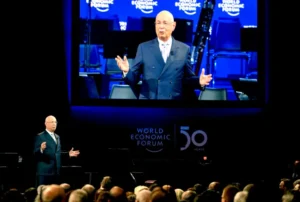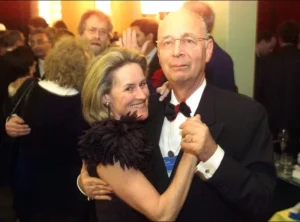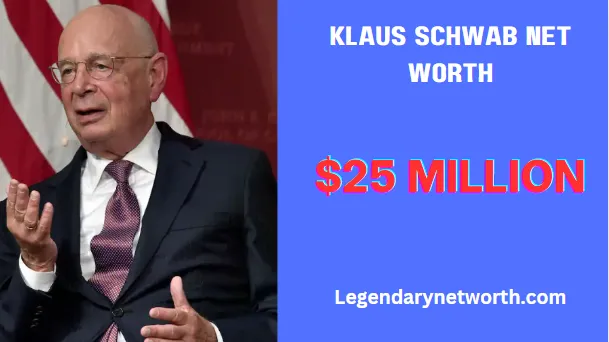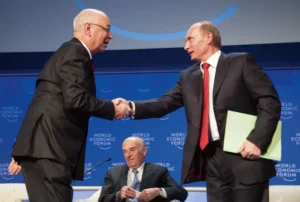Klaus Schwab’s net worth is estimated to be around $25 million. He is the founder and executive chairman of the World Economic Forum.
Klaus Schwab, a prominent figure in global economics, founded the World Economic Forum (WEF) in 1971. This non-profit organization brings together business, political, academic, and other leaders to discuss global issues. Schwab’s leadership has made the WEF an influential platform for shaping economic and social agendas.
His insights on stakeholder capitalism and the Fourth Industrial Revolution have garnered significant attention. With an estimated net worth of $25 million, Schwab continues to influence global economic policies. His work emphasizes the importance of public-private cooperation and sustainable development. Schwab’s contributions extend beyond economics, impacting technology and governance.
Contents
- 1 Klaus Schwab’s Bio
- 2
- 3 The Man Behind The World Economic Forum
- 4 Klaus Schwab’s Financial Journey
- 5 Estimating Klaus Schwab’s Net Worth
- 6 Sources Of Wealth
- 7 Philanthropy And Social Impact
- 8 Controversies And Public Scrutiny
- 9 Lifestyle And Personal Expenditures
- 10 The Future Of Klaus Schwab’s Legacy
- 11 Social Media Profile
- 12 Conclusion
Klaus Schwab’s Bio
| Category | Details |
|---|---|
| Full Name | Klaus Martin Schwab |
| Date of Birth | March 30, 1938 |
| Age | 86 years old |
| Place of Birth | Ravensburg, Nazi Germany |
| Citizenship | German |
| Education | – Mechanical Engineering (Swiss Federal Institute of Technology, Zurich) |
| – Economics (University of Fribourg) | |
| – Master in Public Administration (John F. Kennedy School of Government, Harvard University) | |
| Career Highlights | – Founder and Chairman of the World Economic Forum (WEF) since 1971 |
| – Professor of Business Policy at the University of Geneva (1972-2003) | |
| Family | – Spouse: Hilde Schwab (married in 1971) |
| – Children: 2 | |
| Net Worth | $25 Million. |
The Man Behind The World Economic Forum
Klaus Schwab, the founder of the World Economic Forum, is a name that echoes across global business and political circles. His vision has united leaders worldwide to discuss and shape global, regional, and industry agendas. But who is this influential figure, and how did he rise to such prominence?
Klaus Schwab’s Early Life And Education
Klaus Schwab was born in Ravensburg, Germany, on March 30, 1938. His early life was marked by the challenges of growing up during World War II.
Schwab’s passion for learning was evident from a young age. He pursued his studies with vigour and determination, excelling in his academic endeavours.
| Year | Education Milestone |
| 1961 | She graduated from the Swiss Federal Institute of Technology in Zurich with a degree in mechanical engineering. |
| 1967 | I completed a Doctorate in Engineering at ETH Zurich. |
| 1967 | Earned a Master of Public Administration from Harvard University’s John F. Kennedy School of Government. |
Founding The World Economic Forum
In 1971, Klaus Schwab founded the World Economic Forum (WEF). It began as a small non-profit organization in Geneva, Switzerland.
Schwab’s goal was to create a platform where business leaders could collaborate. He wanted them to solve global problems and share insights.
- The first annual meeting of WEF was held in Davos, Switzerland.
- It attracted over 440 participants from 31 countries.
- Initially, the forum was known as the “European Management Forum”.
- 1987, the World Economic Forum was renamed to reflect its global scope.
Today, the WEF annual meeting in Davos is a pivotal event. It brings political, business, and societal leaders together to discuss the world’s pressing issues.
Klaus Schwab’s Financial Journey

Klaus Schwab, founder and executive chairman of the World Economic Forum, has had a remarkable financial journey. His success story spans decades and reflects his influence and achievements. This section delves into his career milestones, salary, and compensation.
Career Milestones And Achievements
Schwab’s career began in academia. He earned his doctorate in engineering from ETH Zurich and his doctorate in economics from the University of Fribourg. In 1971, Schwab founded the European Management Forum, which later became the World Economic Forum (WEF).
Under his leadership, the WEF grew into a global platform that connects business, political, and academic leaders. The annual Davos meeting is the highlight. Leaders from around the world gather to discuss pressing global issues.
Schwab’s influence extends beyond the WEF. He has authored several books on global economics and governance, and his thoughts and ideas shape international policies. His work has earned him numerous awards and honours, notably the Dan David Prize.
Schwab’s Salary And Compensation
Klaus Schwab’s compensation reflects his leadership role at the WEF. His annual salary is substantial. However, specific figures are not publicly disclosed. Reports suggest it is in line with other top executives of non-profit organizations.
Schwab’s earnings also come from his publications. He has written many influential books, which contribute to his overall net worth. He also receives speaking fees from various engagements. His insights are highly sought after.
Here’s a summary of Schwab’s financial sources:
- Salary: Annual compensation from WEF
- Book Royalties: Earnings from published books
- Speaking Fees: Income from speaking engagements
While Schwab’s net worth is not publicly known, his influence and success suggest significant financial stability.
Estimating Klaus Schwab’s Net Worth
Klaus Schwab is the founder and executive chairman of the World Economic Forum. His net worth is often a topic of interest. Estimating his net worth involves looking at various factors, including public records, wealth assessments, and comparisons with other global leaders.
Public Records And Wealth Assessments
Public records provide a glimpse into Klaus Schwab’s financial world. These records include property ownership, business holdings, and financial disclosures. Schwab’s role at the World Economic Forum comes with a low salary. Instead, his wealth stems from his investments and other ventures.
Wealth assessments often estimate Schwab’s net worth by evaluating these records. For example, Schwab owns several properties in Switzerland and investments in different companies. Analysts use this data to calculate his net worth. Estimates of Schwab’s net worth vary. Some sources suggest it’s around $25 million, while others believe it could be higher.
Comparisons With Other Global Leaders
It is interesting to compare Klaus Schwab’s net worth with that of other global leaders. Many leaders in similar positions have significant wealth. For instance, Bill Gates, co-founder of Microsoft, has over $100 billion net worth. Jeff Bezos, founder of Amazon, boasts a net worth exceeding $200 billion. In contrast, Schwab’s net worth is modest.
| Global Leader | Net Worth |
| Klaus Schwab | $25 million |
| Bill Gates | $100 billion |
| Jeff Bezos | $200 billion |
Other leaders, like Warren Buffett, also have vast fortunes. Buffett’s net worth is around $100 billion. Schwab’s wealth is more minor but still significant. His influence through the World Economic Forum is immense.
Sources Of Wealth
Klaus Schwab is a prominent economist and engineer best known as the World Economic Forum (WEF) founder. His diverse sources of wealth significantly contribute to his net worth. Let’s explore the primary sources of his wealth.
Income From Books And Publications
Klaus Schwab has authored many influential books on global economics, technology, and social issues. His most famous work is “The Fourth Industrial Revolution,” which discusses the impact of emerging technologies on society.
He earns substantial revenue from book sales worldwide. His books are translated into many languages, expanding his reach. Schwab also publishes articles and research papers. These publications add to his income. He often writes for renowned journals and magazines.
Investments And Private Holdings
Schwab has made intelligent investments over the years. These investments span various sectors, including technology, finance, and real estate. His private holdings also play a crucial role in his wealth accumulation.
He holds shares in several multinational corporations. These shares provide dividends and increase in value over time. Schwab’s investment portfolio is diverse and well-managed. This strategy ensures a steady flow of income.
| Source | Details |
| Books and Publications | Revenue from book sales, articles, and research papers. |
| Investments | Shares in multinational corporations and other investments. |
| Private Holdings | Real estate and other private assets. |
Philanthropy And Social Impact
Klaus Schwab, the founder and executive chairman of the World Economic Forum, is a crucial figure in global economics and a dedicated philanthropist. His efforts in philanthropy and social impact are noteworthy. They clearly show how wealth can be used for the greater good.
The Schwab Foundation For Social Entrepreneurship
In 1998, Klaus Schwab and his wife, Hilde, established the Schwab Foundation for Social Entrepreneurship. This foundation aims to support social entrepreneurs who innovate to solve societal issues. The foundation identifies, highlights, and supports these entrepreneurs. It helps them scale their impact and achieve sustainable outcomes.
- Annual Awards: The foundation grants annual awards to recognize exceptional social entrepreneurs.
- Global Network connects awardees to a global network of peers and experts.
- Resources and Mentorship: Provides access to resources, mentorship, and opportunities for collaboration.
The foundation believes that social entrepreneurship can drive significant change. It focuses on areas such as poverty alleviation, healthcare, and education.
Charitable Contributions And Endowments
Klaus Schwab has made substantial charitable contributions and endowments over the years. His donations support various causes, including education, healthcare, and environmental sustainability. Schwab’s philanthropy extends beyond financial contributions. He is actively involved in initiatives that promote social welfare and community development.
| Year | Contribution | Cause |
| 2010 | $10 Million | Education Programs |
| 2015 | $15 Million | Healthcare Initiatives |
| 2020 | $20 Million | Environmental Sustainability |
His endowments often come with a vision for long-term impact. By funding research, innovation, and grassroots efforts, Schwab aims to create a better world.
Klaus Schwab’s commitment to philanthropy and social impact is evident. His efforts in the Schwab Foundation and charitable contributions demonstrate a genuine dedication to making a difference.
Controversies And Public Scrutiny
Klaus Schwab, founder of the World Economic Forum (WEF), is no stranger to controversies. His wealth and influence have sparked debates and calls for greater transparency and accountability. This section delves into these issues and examines the public scrutiny he faces.
Debates Over Wealth And Influence
Many people question the extent of Klaus Schwab’s wealth, which is believed to be worth millions. Critics argue that this level of wealth can lead to undue influence, and they say that his financial power could shape global policies.
Supporters claim that Schwab uses his resources for the greater good, pointing to initiatives like the Great Reset. However, opponents worry that his influence may only sometimes serve public interests. This debate continues to stir public opinion.
Transparency And Accountability Issues
Transparency is a major concern regarding Schwab and the WEF. Critics argue that the organization lacks transparency. They call for more disclosure of financial details and want clarity on decision-making processes.
Accountability is another hot topic. People demand that Schwab and the WEF be held accountable for their actions. They seek assurances that the organization operates ethically. These calls for transparency and accountability are growing louder.
Here is a table summarizing the key concerns:
| Issue | Description |
| Wealth | Questions about the extent of Schwab’s fortune |
| Influence | Concerns about his impact on global policies |
| Transparency | Calls for more disclosure of financial and decision-making details |
| Accountability | Demands for ethical operations and accountability |
These concerns highlight the ongoing scrutiny of Klaus Schwab and his organization. The public continues to watch closely.
Lifestyle And Personal Expenditures

Klaus Schwab, the founder of the World Economic Forum, leads a life marked by luxury and sophistication. His financial success is evident in his lifestyle choices and personal expenditures. From real estate to travel, Schwab’s investments reflect his high status and taste.
Real Estate And Assets
Schwab owns several luxurious properties worldwide, including a million-dollar villa in Cologny, Switzerland, which offers breathtaking views of Lake Geneva.
He also has a modern apartment in one of the most prestigious neighbourhoods in New York City. It’s a prime example of his keen eye for valuable assets.
Schwab’s collection includes rare art pieces and antique furniture, adding elegance to his home’s homes. These assets represent a significant portion of his net worth.
Travel And Security Costs
Schwab’s travel expenses are substantial. He frequently travels for business and pleasure, preferring private jets and first-class tickets.
His travel itinerary includes high-profile destinations. These trips often require heightened security measures. Security costs form a considerable part of his expenditures.
Schwab employs security professionals who ensure his safety during public appearances and private events. Their services are essential and expensive.
Below is a table summarizing Schwab’s lifestyle expenses:
| Category | Estimated Cost |
| Real Estate | $30 million |
| Travel | $5 million annually |
| Security | $2 million annually |
Schwab’s lifestyle reflects his immense wealth. His expenditures on real estate, travel, and security are significant.
The Future Of Klaus Schwab’s Legacy
Klaus Schwab, the founder and executive chairman of the World Economic Forum (WEF), has significantly influenced global economics. With his remarkable net worth, Schwab’s legacy is poised to shape future generations. His strategic vision and financial prowess will drive this legacy.
Succession And The Wef’s Direction
The World Economic Forum’s (WEF) future largely depends on its leadership. Klaus Schwab’s successor will play a crucial role in continuing his vision. It’s imperative to choose a leader who aligns with Schwab’s values.
Schwab’s approach has always emphasized collaboration and innovation. The new leader must maintain these principles to ensure the WEF’s continued relevance. The direction the WEF takes will impact global policies and economies.
The Impact Of Schwab’s Wealth On Future Initiatives
Klaus Schwab’s substantial wealth can drive impactful initiatives. His financial resources can support numerous global projects. These projects can range from sustainable development to technological advancements.
Here’s a table summarizing the potential areas of impact:
| Initiative | Impact |
| Sustainable Development | Promotes environmental conservation and reduces carbon footprint |
| Technological Advancements | Encourages innovation and improves global connectivity |
| Education Programs | Enhances global literacy and skills development |
Schwab’s wealth can also fund educational programs. These programs can help bridge the knowledge gap in developing countries. Such initiatives will ensure a more equitable world.
His investments in technology can spur innovation. This can lead to new solutions for global challenges. Schwab’s financial influence is a powerful tool for positive change.
Social Media Profile
| Platform | Links |
| IMDb | Click here |
| Wikipedia | Click here |
Conclusion
Klaus Schwab’s net worth reflects his significant influence and impact. Understanding his financial standing sheds light on his contributions. Stay updated on figures to grasp his evolving legacy. Schwab’s wealth is a testament to his global influence. Keep following for more insights into influential personalities.
>>>Also Read About: Jonas Brothers Net Worth And Biography



